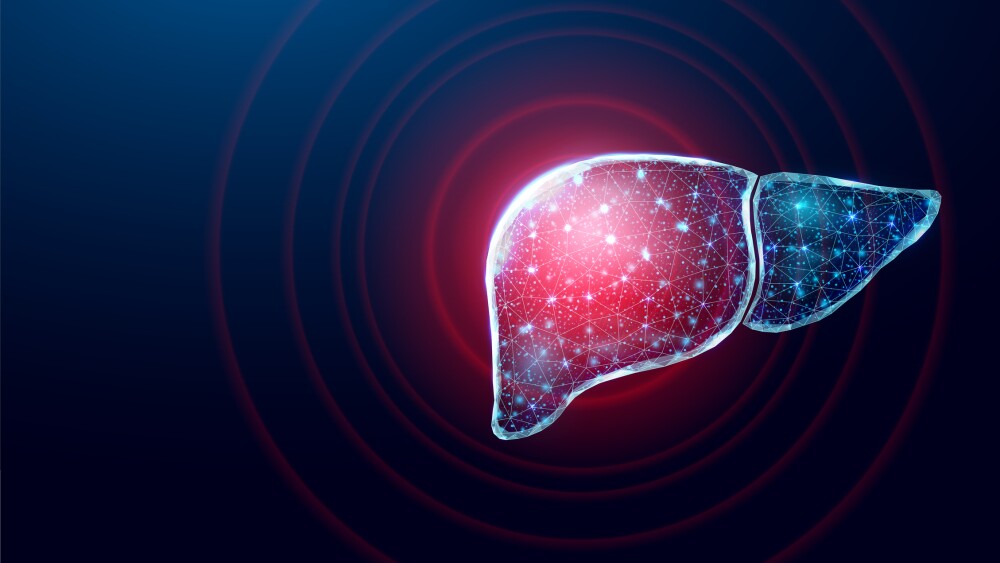Intercept Pharmaceuticals, Inc. announced that results from two analyses assessing the potential of obeticholic acid to improve outcomes for patients with primary biliary cholangitis, including death, liver transplant and hepatic decompensation, will be presented at The Liver Meeting®, the annual meeting of the American Association for the Study of Liver Diseases.
- Efficacy of OCA vs. placebo and external controls accepted as a late-breaker poster
- HEROES-US data to be presented in oral session on Sunday, November 6
MORRISTOWN, N.J., Nov. 06, 2022 (GLOBE NEWSWIRE) -- Intercept Pharmaceuticals, Inc. (Nasdaq: ICPT), a biopharmaceutical company focused on the development and commercialization of novel therapeutics to treat non-viral liver diseases, today announced that results from two analyses assessing the potential of obeticholic acid (OCA) to improve outcomes for patients with primary biliary cholangitis (PBC), including death, liver transplant and hepatic decompensation, will be presented at The Liver Meeting®, the annual meeting of the American Association for the Study of Liver Diseases (AASLD).
Efficacy of Obeticholic Acid (OCA) vs. Placebo and External Control (EC) on Clinical Outcomes in Primary Biliary Cholangitis (PBC) (late-breaker poster, Monday, Nov. 7)
This analysis assessed the effect of OCA treatment on time to first occurrence of PBC disease progression (hepatic decompensation), liver transplant or death of OCA-treated subjects in the Phase 3b/4 COBALT trial compared to placebo and compared to a non-OCA-treated external control (EC) group created from the Komodo Health U.S. claims database.
COBALT was a randomized, double-blind, placebo-controlled confirmatory trial designed to assess efficacy and safety of OCA in patients with advanced PBC. As previously disclosed, the study was terminated in December 2021, before it was fully enrolled, for lack of feasibility. The placebo-controlled analysis of COBALT showed no statistically significant difference in either the Original Primary Composite Endpoint (time to first occurrence of death, liver transplant or serious liver-related events) or the FDA Expanded Primary Endpoint, which also included additional liver-related events.
In anticipation of feasibility challenges, the COBALT analysis plan included an EC group as a second comparator arm. The EC group, created from Komodo Health claims database, had to meet COBALT inclusion and exclusion criteria and were weighted using propensity score-derived standardized morbidity ratios (SMRs). The EC group was comparable to OCA-treated patients in COBALT on all measured baseline variables. Endpoints in this comparison were the same as in the primary analysis of the COBALT trial to the extent possible; however certain variables, such as MELD (model for end-stage liver disease), were not available in the Komodo database and thus not included.
Results from the EC group as-treated analysis showed statistical significance in both the original and the FDA-expanded primary endpoints comparing the OCA-treated subjects in COBALT with the non-OCA-treated patients in EC:
- From the Original Primary Composite Endpoint: 17 (10%) events occurred in subjects in the COBALT OCA arm and 35 (22%) in patients from the non-OCA-treated EC arm (HR=0.39; 95% CI 0.22, 0.69; p<0.01), reflecting a 61% reduction in risk of events at any time during follow-up.
- From the FDA Expanded Primary Endpoint: 28 (17%) events occurred in subjects in the COBALT OCA arm and 46 (28%) in patients from the non-OCA-treated EC arm (HR=0.48; 95% CI 0.30, 0.77; p<0.01), reflecting a 52% reduction in risk of events at any time during follow-up.
“We have long understood the challenges of running placebo-controlled, post-marketing studies, which is why we initiated real-world analyses and leveraged rigorously matched external controls for COBALT to provide additional opportunities to understand the effect of OCA on clinical outcomes in PBC,” said M. Michelle Berrey, M.D., MPH, President, Research & Development and Chief Medical Officer of Intercept. “We believe that the real-world data we have generated to date demonstrate long-term benefits to people with PBC who are receiving OCA, specifically improved event-free survival, which we know to be the most important treatment goal for patients and clinicians.”
Results of the HEROES Study: Treatment Efficacy of Obeticholic Acid on Hepatic Real-World Outcomes in Patients with Primary Biliary Cholangitis (oral presentation, Sunday, Nov. 6)
HEROES-US leveraged the Komodo Health database in a fully real-world study to assess the potential benefits of OCA treatment on death, liver transplant and hospitalization for hepatic decompensation in PBC patients with compensated liver disease. The study looked at a pre-defined group of patients with PBC who were treated with OCA and a comparable group of PBC patients who were eligible, but who were not treated with OCA. Characteristics of patients who initiated treatment with OCA were SMR-weighted to OCA-eligible patients not treated with OCA.
A statistically significant and clinically meaningful reduction in all-cause death, liver transplant, or hospitalization for hepatic decompensation was seen among OCA-treated patients compared to the control group who were not treated with OCA.
- Treatment with OCA resulted in a 63% reduction in relative risk for death, liver transplant and hospitalization for hepatic decompensation (HR=0.37; 95% CI 0.14, 0.75; p<0.001).
- Results were consistent with those observed for comparable endpoints in the POISE trial open-label extension vs. Global PBC patient registry external controls (HR=0.42; 95% CI=0.21, 0.85; p=0.02; Gastroenterology 2022), and the COBALT trial vs. Komodo EC as reported above.
“The HEROES-US study provides clear insights on the effect of OCA on clinical outcomes beyond biochemical measures like alkaline phosphatase,” said Dr. Kris V. Kowdley, Director of Liver Institute Northwest, and Professor at the Elson S. Floyd College of Medicine, Washington State University. “Furthermore, these data underscore results we’ve seen across multiple analyses, building on the robust body of evidence showing the positive impact of long-term treatment with OCA.”
About Intercept
Intercept is a biopharmaceutical company focused on the development and commercialization of novel therapeutics to treat progressive non-viral liver diseases, including primary biliary cholangitis (PBC) and nonalcoholic steatohepatitis (NASH). For more information, please visit www.interceptpharma.com or connect with the company on Twitter and LinkedIn.
About Primary Biliary Cholangitis
Primary biliary cholangitis (PBC) is a rare, progressive and chronic autoimmune disease that affects the bile ducts in the liver and is most prevalent (approximately 1 in 10,000) in women over the age of 40. PBC causes bile acid to build up in the liver, resulting in inflammation and scarring (fibrosis), which, if left untreated, can lead to cirrhosis, a liver transplant, or death.
About COBALT
COBALT (NCT02308111) was a Phase 3b/4, double-blind, randomized, placebo-controlled, multicenter study that was designed to assess the effect of OCA on clinical outcomes in people living with PBC with an inadequate therapeutic response to UDCA or who were unable to tolerate UDCA. In this trial, eligible people with PBC who were enrolled while on UDCA treatment remained on therapy and were randomized into one of two treatment arms. Patients received placebo or OCA 5 mg daily or 5 mg weekly, based on disease severity, and titrated over the course of the trial to a maximum of OCA 10 mg daily, based on tolerability and biochemical response. Patients were evaluated every three months. The original primary endpoint of the trial was time to first occurrence of any of the following adjudicated events: all-cause death, liver transplant, or other serious liver-related events. Prior to early termination of COBALT, FDA and Intercept agreed on a new primary composite endpoint consisting of a set of expanded, clinically relevant events, including additional decompensation events, as well as clinical events that occur earlier in the disease course and indicate progression toward decompensation.
About HEROES
HEROES is a set of two retrospective studies (NCT05292872, NCT05293938) which leverage real-world datasets to assess the impact of OCA on important clinical outcomes in people living with PBC. The first of these, HEROES-US, leveraged the Komodo Health claims database, linked via Datavant tokenization to Quest and LabCorp laboratory data and the Social Security Death Index, to compare clinical outcomes (defined as all-cause death, liver transplant, or hospitalization for hepatic decompensation) of PBC patients who were treated with OCA with PBC patients who were eligible, but not treated with OCA. In the analysis, patients were required to have one inpatient PBC claim, or two outpatient claims separated by more than one day; a history of UDCA use; an elevated ALP and/or total bilirubin; and meet comorbidity exclusion criteria. Propensity scores and standardized morbidity ratios were used to weight cohorts to ensure comparable baseline clinical and demographic characteristics, comorbidities, disease and treatment history. This trial was designed and executed following FDA’s draft guidance on use of real-world evidence to support regulatory decision-making for drug and biological products.
Forward-Looking Statements
This press release contains forward-looking statements (“FLS”), including regarding the results of our clinical studies, and the safety and efficacy of OCA. Important factors could cause actual results to differ materially from the FLS, including further developments regarding understanding of patient outcomes, side effects, or study methodology.
Contact
For more information about Intercept, please contact:
For investors:
Nareg Sagherian, Executive Director, Global Investor Relations
Investors@interceptpharma.com
For media:
Karen Preble, Executive Director, Global Corporate Communications
Media@interceptpharma.com




